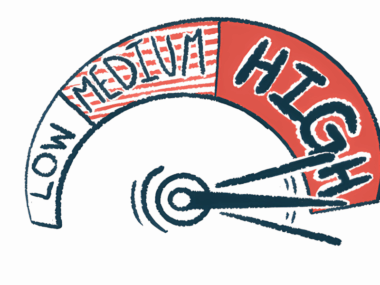Efgartigimod Better Than Placebo at Easing gMG Symptoms: ADAPT Trial
Written by |

More adults with generalized myasthenia gravis (gMG) who were treated with efgartigimod in a Phase 3 trial experienced minimal or no symptoms than did those given a placebo, an analysis of new study data reported.
Other analyses from the ADAPT trial highlighted the potential benefits of efgartigimod for people who are negative for the most common type of disease-causing antibody seen in MG.
“The additional ADAPT data … strengthen our understanding of the value efgartigimod can offer as a potential treatment for people living with gMG,” Wim Parys, MD, chief medical officer at Argenx, the company developing efgartigimod, said in a press release.
MG is caused by the immune system wrongly launching an attack against proteins that are involved in nerve-muscle communication. This attack is driven by self-reactive antibodies, most commonly those targeting a protein receptor called the acetylcholine receptor (AChR).
Efgartigimod is designed to interfere with the process through which these harmful antibodies are recycled, with the goal of increasing the rate at which they are destroyed. By doing so, efgartigimod is expected to lower antibody levels in the bloodstream and ease MG symptoms.
The Phase 3 ADAPT trial (NCT03669588), sponsored by Argenx, evaluated the safety and efficacy of efgartigimod in 167 adults with gMG. Of these, 129 were positive for anti-AChR antibodies and 38 were negative.
Participants were randomly assigned to efgartigimod (10 mg/kg) or a placebo, given in cycles of four hour-long infusions over the course of four weeks. A maximum of three treatment rounds were allowed over the trial’s 26 weeks (about six months).
Results, reported last year, were positive, indicating that efgartigimod was able to ease gMG symptoms, regardless of the presence of anti-AChR antibodies.
Applications for its regulatory approval as a gMG treatment, supported by these findings, are currently being reviewed in the U.S. and in Europe.
Now, researchers at Argenx and other institutions shared additional analyses of trial data in a pair of posters presented at the American Association of Neuromuscular and Electrodiagnostic Medicine (AANEM) annual meeting, taking place Oct. 13–16 in Aurora, Colorado.
In one poster, the team examined the proportion of anti-AChR-positive patients who had minimal or no symptoms after treatment, corresponding to a score of 0 or 1 on the Myasthenia Gravis Activities of Daily Living (MG-ADL), a standardized measure of MG symptoms severity. The poster was titled, “Minimal Symptom Expression in Patients with Generalized Myasthenia Gravis from Treatment with Efgartigimod.”
After the first round of treatment, significantly more adults on efgartigimod had minimal symptoms compared with those given a placebo (59.1% vs. 36.8%). After a second treatment round, 16 of 36 (44.4%) patients on efgartigimod had minimal symptoms, while none of the 11 patients assigned to a placebo did.
Other analyses showed that the length of time spent with minimal symptoms was markedly longer among efgartigimod-treated patients than among those in the placebo group.
In the other poster, “Examination of the Efficacy, Safety, And Tolerability of Efgartigimod in Acetylcholine Receptor Autoantibody Seronegative Patients with Generalized Myasthenia Gravis: Subgroup Analysis of the Phase 3 ADAPT Study,” researchers reported data from the subset of 38 ADAPT patients negative for anti-AChR antibodies.
Among them, the proportion of responders — defined as an improvement in MG-ADL scores of at least two points, lasting at least four weeks — was similar among those given efgartigimod or a placebo (about 65% in both groups).
However, the proportion of anti-AChR-negative patients with minimal symptoms was markedly higher in the efgartigimod-treated group compared with placebo (31.6% vs. 15.8%).
A marked difference was also seen for the proportion of patients found to be responders on the Quantitative MG (QMG) score, a measure of muscle strength (52.6% vs. 36.8%). To be considered responders, patients must have QMG scores that drop by at least three points over at least four consecutive weeks.
“Depth and consistency of disease score improvement … are all key considerations for a treating physician,” Parys said.
Neither of these differences were considered statistically significant. The researchers noted that this analysis was not powered to detect significance — in other words, too few patients were available for the analysis to detect a significant effect with certainty, even if it existed.
“Further studies assessing the efficacy of efgartigimod in [anti-AChR antibody-negative MG] are warranted,” the researchers wrote.
Safety data in the anti-AChR-negative subgroup was similar to findings from the overall study. Rates of adverse events (side effects) were similar among participants given efgartigimod or placebo. The most common included headache, common cold, and nausea.
Argenx is also planning to present additional ADAPT data at the virtual Myasthenia Gravis Foundation of America Scientific Session (MGFA) set for Oct. 30, including into the consistency of efgartigimod’s benefits as seen across several muscle groups, and regardless of background immunosuppressive therapy.
It will also present data on efgartigimod’s effects on patients receiving vaccines during trials. Findings have demonstrated that the investigational therapy does not influence a patient’s ability to develop a vaccine immune response.







Leave a comment
Fill in the required fields to post. Your email address will not be published.